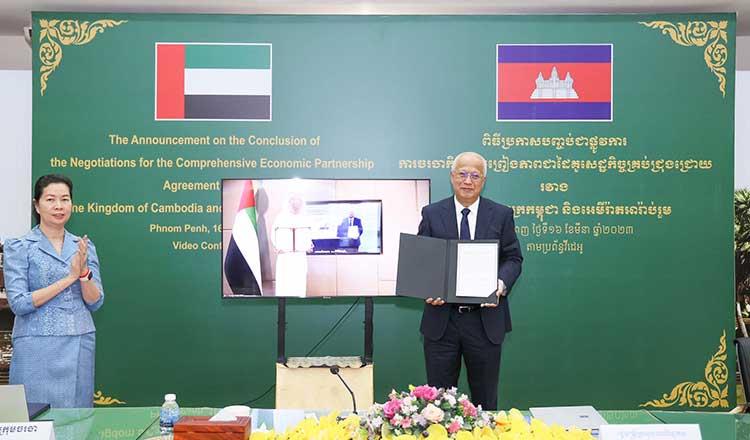The Comprehensive Economic Partnership Agreement (CEPA) between Cambodia and the United Arab Emirates (UAE) is expected to be signed by the end of 2023. When signed, this Agreement will give the 2 countries the legal framework to tighten the countries’ cooperation and collaboration in various aspects, including Intellectual Property aspect.
The Comprehensive Economic Partnership Agreement (CEPA) is a type of free trade agreement that aims to promote economic cooperation and liberalize trade between countries.
A Comprehensive Economic Partnership Agreement is a bilateral or regional trade agreement designed to enhance economic integration and promote trade and investment between participating countries. CEPA aims to reduce barriers to trade, create a more favorable business environment, and foster economic cooperation in various sectors.
CEPAs typically cover a wide range of areas beyond just the trade in goods. They often include provisions on services, investment, intellectual property rights, competition policy, and other aspects related to trade and economic cooperation. The exact scope and coverage of a CEPA can vary depending on the participating countries and their negotiation priorities.
The primary objectives of a CEPA include:
- Facilitating Trade: CEPA aims to reduce or eliminate tariffs, quotas, and other trade barriers to promote the flow of goods and services between participating countries.
- Promoting Investment: CEPA seeks to create favorable conditions for investment, including provisions for investor protection, dispute settlement, and liberalization of investment rules.
- Enhancing Market Access: CEPA aims to improve market access for goods and services by reducing non-tariff barriers, such as technical regulations, customs procedures, and licensing requirements.
- Strengthening Economic Cooperation: CEPA often includes provisions for cooperation in areas such as customs procedures, standards and regulations, intellectual property, and capacity building to foster economic integration and development.
CEPAs are negotiated between participating countries, and the process can involve multiple rounds of discussions, consultations, and formal negotiations. Once the agreement is reached, it goes through a legal review and domestic ratification processes in each participating country before it can be implemented.
CEPAs offer several potential benefits, including:
- Increased Trade: By reducing trade barriers, CEPAs aim to stimulate trade flows between participating countries, leading to increased export opportunities and market access for businesses.
- Economic Growth: CEPA can contribute to economic growth by attracting investment, creating jobs, and fostering a more competitive business environment.
- Regulatory Harmonization: CEPA often includes provisions for harmonizing regulations and standards, making it easier for businesses to comply with requirements and access new markets.
- Enhanced Cooperation: CEPAs provide a framework for enhanced cooperation in areas beyond trade, such as intellectual property, investment, and technology transfer, which can benefit participating countries through knowledge sharing and capacity building.
Notable examples of Comprehensive Economic Partnership Agreements include the Comprehensive Economic Partnership Agreement between India and Japan, the Comprehensive Economic and Trade Agreement (CETA) between the European Union and Canada, and the ASEAN-Korea Comprehensive Economic Partnership (AKCEP).
Comprehensive Economic Partnership Agreement (CEPA) between Cambodia and the United Arab Emirates (UAE)
Representatives from Cambodia and the United Arab Emirates (UAE) recently announced the successful completion of their third round of talks on the Comprehensive Economic Partnership Agreement (CEPA). The initial round took place in Dubai in December 2022, followed by subsequent rounds in Phnom Penh and Dubai. The CEPA, similar to other agreements of its kind, encompasses various aspects such as trade in goods and services, investment, rules of origin, technical trade barriers, intellectual property, and economic and technological cooperation. Both nations have reached an agreement on these matters.
In addition to the mutual benefits, the CEPA is expected to contribute to resolving tensions between the Middle East and the Association of Southeast Asian Nations (ASEAN), thereby establishing a robust bridge connecting the two jurisdictions. To commemorate the closure of the CEPA, the two countries have decided to hold a formal ceremony during the visit of Thani bin Ahmed al-Zeyoudi, the UAE’s Minister of State for International Trade, to Cambodia next month. While an official signing date for the CEPA has not been announced, local authorities anticipate that it will take place before the end of 2023.
You can see a list of UAE IP firms here.

